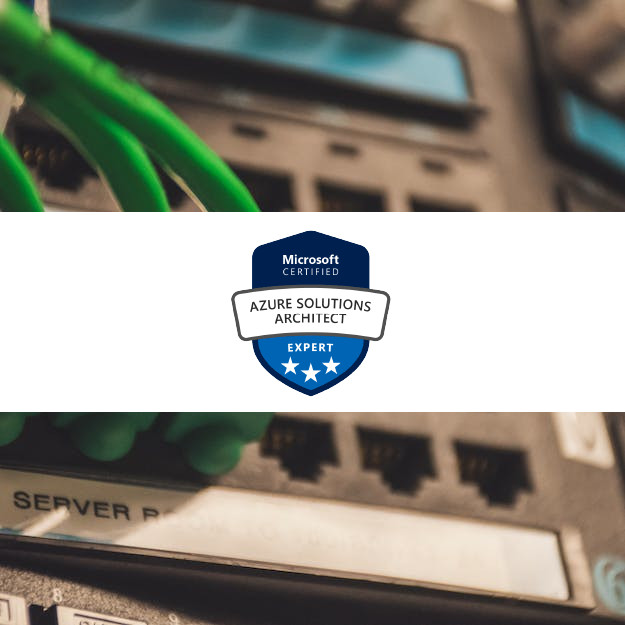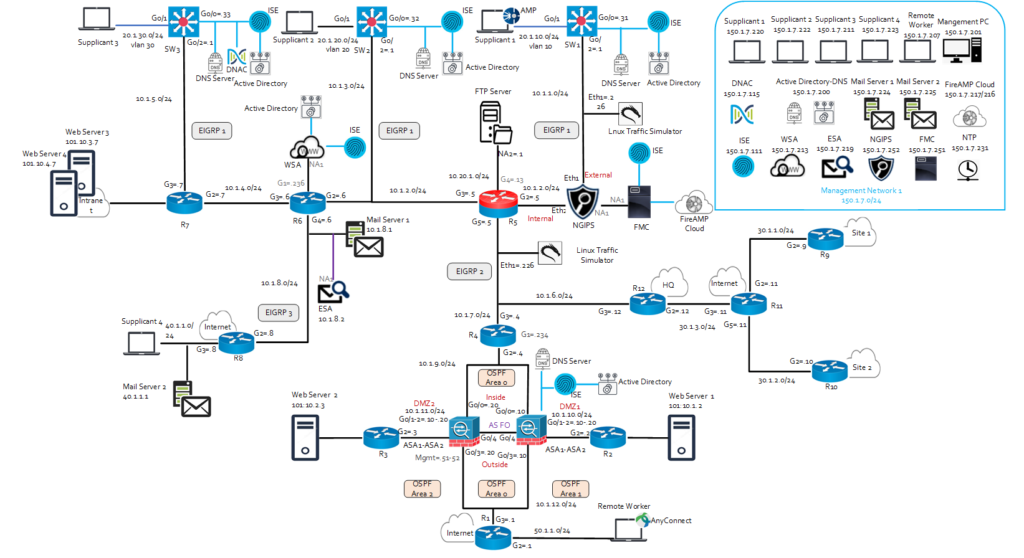

EXPLORE.PERSIST.MASTER.
Microsoft Azure Architect Technologies Training.
Share :
+971 43346660
Azure Architect Technologies certification training by IP Rulers will establish you as an expert Azure solutions architect and is aligned with exams AZ-303: Azure Architect Technologies. You will learn to configure infrastructure, implement workloads and security, create and deploy apps, secure data, determine workload requirements, architect data platform, and cloud solutions, create continuity and infrastructure strategies, and execute deployment, migration and API integration.
Azure Architect Technologies training by IP Rulers is course based on one of the most recent additions to the Microsoft family of exams. Its central focus is testing whether an Azure Solutions Architect has the know-how to advise stakeholders on translating business requirements into secure, scalable and reliable solutions. For someone looking to take the exam, that means you’ll need a holistic understanding of IT operations, networking, virtualization, identity, security, business continuity, budgeting, and governance. This Azure Solutions Architect Expert training will demonstrate combining those topics with business knowledge to address each organization’s unique requirements. A candidate for this exam should have advanced experience and knowledge of IT operations, including networking, virtualization, identity, security, business continuity, disaster recovery, data platform, budgeting, and governance–this role should manage how decisions in each area affect an overall solution.An Azure Solution Architect partners with cloud administrators, cloud DBAs, and clients to implement solutions.
Required Exam: AZ-303: Microsoft Azure Architect Technologies
AZ-303 Azure exam objectives, including these topics:
- Using virtual machines (VMs), ARM templates, and Azure Disk Encryption
- Creating Azure Managed Kubernetes Service (AKS) clusters
- Integrating caching and content delivery with Azure Redis cache and Azure CDN
- Creating Azure App Service web apps, mobile apps, and API apps
- Developing solutions that use Cosmos DB and blob storage
- Implementing authentication, access control, and secure data solutions
- Developing App Service Logic Apps
Target Audience
This Azure Architect training is considered professional-level Microsoft training, which means it was designed for Azure developers. This Azure skills course is designed for Azure developers with three to five years of experience with Azure.
- System Administrator
- Network Administrator
- Software Developer
- Web Developer
Prerequisite
A candidate for this exam should have advanced experience and knowledge of IT operations, including networking, virtualization, identity, security, business continuity, disaster recovery, data platform, budgeting, and governance–this role should manage how decisions in each area affect an overall solution. In addition, this role should have expert-level skills in Azure administration and have experience with Azure development and DevOps processes.
- Become a champion in cloud computing concepts in the fast changing world of technology cloud computing concepts
- Ability to recognize customer requirements and implement proposed solutions of Cloud.
- Enhanced job opportunities related with core services available with Microsoft Azure
- You will be able to demonstrate a strong knowledge of cloud concepts, as well as Azure services, workloads, security, privacy, pricing, and support.
- Training will give the IT professionals a deep understanding of Azure cloud services and how to make them
- Azure Architect Technologies training is considered expert-level Microsoft training, which means it was designed for Azure Architects.
Duration
40 Hours
Skill Level
Expert
Certificate
Yes
Modules
4
Language
English
Mode
Online/Offline
Key Highlights
- Live Instructor-Led Training (Online & Classroom)
- 40 Hours of Technology Lectures
- Weekdays (Tue - Fri)
- Weekend (Fri-Sat or Sat-Sun)
- Real World Live Scenarios and Migrations
- Exam question bank and Preparation
Key Highlights
- 100% Pass Guarantee
- 24/7 Access to the Learning Resources
- Hands-on Lab Practice on physical equipment
- Flexible Installment Plans
- Boot Camp Training for a Fast Track Learning
- Demand-driven recorded video lectures for references
Course Curriculam
1.1 Implement cloud infrastructure monitoring
- monitor security
- monitor performance
- monitor health and availability
- monitor cost
- configure advanced logging
- configure logging for workloads
- configure and manage advanced alerts
1.2 Implement storage accounts
- select storage account options based on a use case
- configure Azure Files and blob storage
- configure network access to the storage account
- implement Shared Access Signatures and access policies
- implement Azure AD authentication for storage
- manage access keys
- implement Azure storage replication
- implement Azure storage account failover
1.3 Implement VMs for Windows and Linux
- configure High Availability
- configure storage for VMs
- select virtual machine size
- implement Azure Dedicated Hosts
- deploy and configure scale sets
- configure Azure Disk Encryption
1.4 Automate deployment and configuration of resources
- save a deployment as an Azure Resource Manager template
- modify Azure Resource Manager template
- evaluate location of new resources
- configure a virtual disk template
- deploy from a template
- manage a template library
- create and execute an automation runbook
1.5 Implement virtual networking
- implement VNet to VNet connections
- implement VNet peering
1.6 Implement Azure Active Directory
- add custom domains
- configure Azure AD Identity Protection
- implement self-service password reset
- implement Conditional Access including MFA
- configure user accounts for MFA
- configure fraud alerts
- configure bypass options
- configure Trusted IPs
- configure verification methods
- implement and manage guest accounts
- manage multiple directories
1.7 Implement and manage hybrid identities
- install and configure Azure AD Connect
- identity synchronization options
- configure and manage password sync and password writeback
- configure single sign-on
- use Azure AD Connect Health
2.1 Manage workloads in Azure
- migrate workloads using Azure Migrate
- implement Azure Backup for VMs
- implement disaster recovery
- implement Azure Update Management
2.2 Implement load balancing and network security
- implement Azure Load Balancer
- implement an application gateway
- implement a Web Application Firewall
- implement Azure Firewall
- implement the Azure Front Door Service
- implement Azure Traffic Manager
- implement Network Security Groups and Application Security Groups
- implement Bastion
2.3 Implement and manage Azure governance solutions
- create and manage hierarchical structure that contains management groups,
2.4 subscriptions and resource groups
- assign RBAC roles
- create a custom RBAC role
- configure access to Azure resources by assigning roles
- configure management access to Azure
- interpret effective permissions
- set up and perform an access review
- implement and configure an Azure Policy
- implement and configure an Azure Blueprint
2.5 Manage security for applications
- implement and configure KeyVault
- implement and configure Azure AD Managed Identities
- register and manage applications in Azure AD
3.1 Implement an application infrastructure
- create and configure Azure App Service
- create an App Service Web App for Containers
- create and configure an App Service plan
- configure an App Service
- configure networking for an App Service
- create and manage deployment slots
- implement Logic Apps
- implement Azure Functions
3.2 Implement container-based applications
- create a container image
- configure Azure Kubernetes Service
- publish and automate image deployment to the Azure Container Registry
- publish a solution on an Azure Container Instance
4.1 Implement NoSQL databases
- configure storage account tables
- select appropriate CosmosDB APIs
- set up replicas in CosmosDB
4.2 Implement Azure SQL databases
- configure Azure SQL database settings
- implement Azure SQL Database managed instances
- configure HA for an Azure SQL database
- publish an Azure SQL database
lab infrastructure.

CCIE enterprise infrastructure v1.1 equipment and software list:


The practical exam tests candidates on solutions that can be configured using the below
Equipment and software versions. Candidates may see more recent software versions
during their attempt but will only be tested on features that are supported in the list below.
Passing the exam requires a depth of understanding difficult to obtain without hands-on
experience. Early in your preparation you should arrange access to equipment and soft-
ware similar to that used on the exam.
Virtual machines
- Cisco Catalyst 8000V Routers with Cisco IOS XE Software Release 17.9
- Cisco IOSv with Cisco IOS Software Release 15.8
- Cisco IOSv-L2 with Cisco IOS Software Release 15.2
- Cisco SD-WAN (vManage, vBond, vSmart, cEdge) Software Release 20.9
- Cisco DNA Center, Release 2.3

Physical Equipment
- Cisco Catalyst 9300 Switches with Cisco IOS XE Software Release 17.9 Other (supporting virtual machines)
- Cisco Identity Services Engine 3.1
- Linux Desktop
Topology


Modes Of Training
We provide various modes of training, each catering to different learning styles, preferences, and needs.You can make your choice of training mode.
- Classroom-Based Training
- One-On-One Training
- Online Training
- Corporate Training
- Fast Track Training
- Private Group Training
- Lab Workshop Training
Instructors
MCSE,RHCE,CCNP,CEH,CSA,CCSE,F5-CTS, AWS & Azure
Certified instructor with 20+ years of experience in the field of cloud and cybersecurity. Proven success in leveraging educational theories and methodologies to design, develop, and deliver successful training programs and integrate instructional technology to provide onsite and virtual training. Babu has helped IPRULERS in setting the bar for cloud and cyber security training and helping thousands of engineers to obtain their own certifications. He excels in corporate training and has excellent interpersonal skills that make him stand out. Babu has proven his knowledge and skills in delivering training for the Microsoft, Amazon, f5, Check Point, EC-Council, CompTIA & Cisco etc.

Babu Varghese
Senior Cloud & Security Specialist




